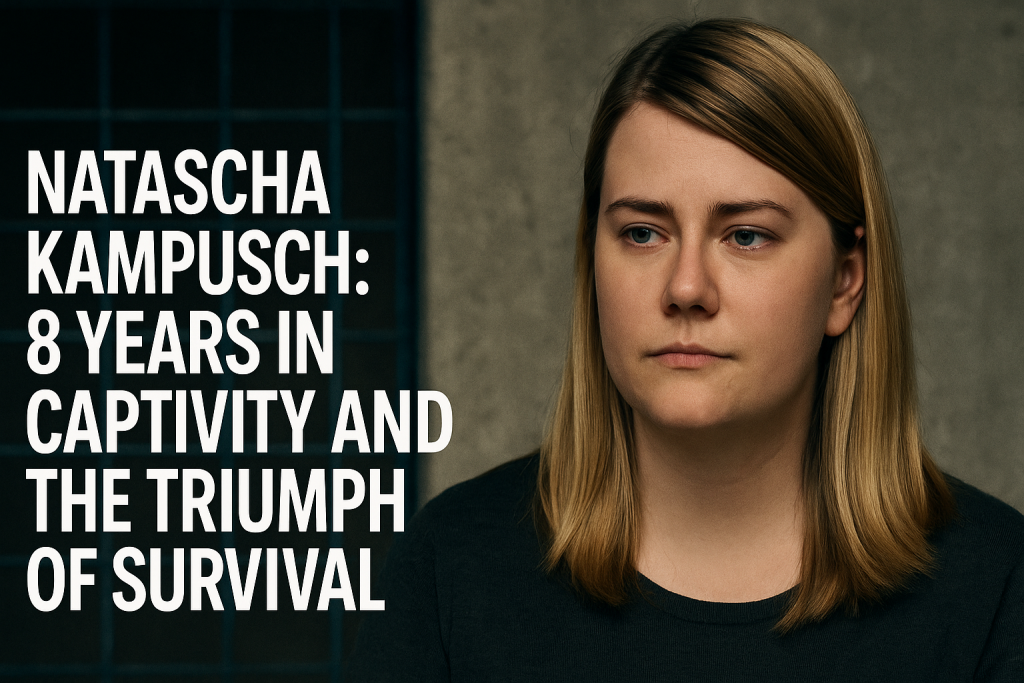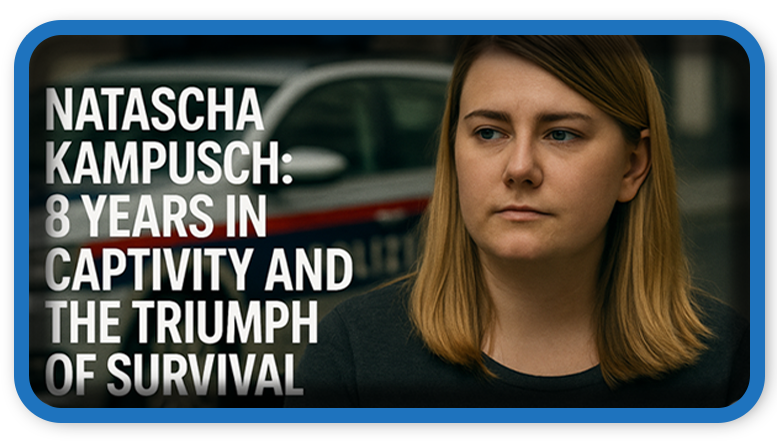⏲️ Estimated reading time: 4 min
Natascha Kampusch was abducted at age 10 and held captive in a hidden basement for over 8 years. Her shocking story of survival, psychological manipulation, and eventual escape continues to grip the world.
The Abduction: A Normal Day That Changed Forever
On March 2, 1998, in Vienna, Austria, 10-year-old Natascha Kampusch was walking to school when she was suddenly abducted by a man in a white van. That man was Wolfgang Přiklopil, a telecommunications engineer who had meticulously planned the kidnapping. The abduction happened in broad daylight, yet Natascha vanished without a trace, sparking a massive nationwide search. Her parents and authorities feared the worst but no one imagined she would still be alive years later.

The Hidden Prison: Life in a Cell Beneath the House
Přiklopil took Natascha to his home in Strasshof an der Nordbahn, a suburb of Vienna. Beneath his garage, he had constructed a concealed, windowless cell measuring just 5 square meters (53 square feet). For the first few years, Natascha lived entirely underground, with no sunlight or human interaction beyond her captor.
The room had no natural light, barely enough space to stand, and was accessed through a secret door hidden behind a wardrobe. Wolfgang exercised total control regulating her food, speech, and even toilet access. He beat her, threatened her, and constantly reinforced the idea that escape was impossible. He told her the outside world was dangerous and that no one was looking for her anymore.
A Twisted Dynamic: The Psychological Prison
As time went on, Přiklopil gave Natascha more “freedom” inside the house. She began doing housework, reading books, and watching TV. But this wasn’t kindness it was part of a strategy to isolate and manipulate her further.
Psychologists would later describe her case as an example of Stockholm Syndrome, a condition where captives form emotional bonds with their captors. Natascha herself has pushed back on this label, saying it oversimplifies the complex relationship she had with her abuser, which was grounded in fear, dependency, and survival instincts.
The Escape: A Glimpse of Freedom
On August 23, 2006, after more than 3,000 days in captivity, Natascha finally saw a chance to escape. Přiklopil was distracted by a phone call and asked her to vacuum his car. Seizing the rare moment outside and unguarded, she ran through the neighborhood and eventually found help from a woman who called the police.
Authorities quickly confirmed her identity through DNA tests, and the news spread like wildfire Natascha Kampusch had survived. Just hours later, her captor, Wolfgang Přiklopil, died by suicide by jumping in front of a train.
Life After Captivity: Freedom, Pain, and Rebuilding
At age 18, Natascha emerged into a world that had drastically changed. She faced public scrutiny, tabloid sensationalism, and endless questions. Many struggled to understand why she hadn’t escaped earlier or how she could speak without hatred for her kidnapper.
She responded by writing a book, “3,096 Days”, which became a bestseller and was later turned into a film. In it, she describes not only the brutal realities of her imprisonment but also the internal resilience that helped her survive. She also gained ownership of her captor’s house, a deeply symbolic decision that allowed her to reclaim control over the place where she had once been powerless.
Public Perception and Media Pressure
Natascha’s calm demeanor and complex view of her captivity left many puzzled. Some praised her maturity and strength, while others accused her of defending a monster. The media’s obsession with her story, and their frequent intrusion into her life, became a second kind of imprisonment.
In several interviews, she emphasized that she was a survivor, not a victim. Her goal was to regain her autonomy, not to remain trapped in the public eye as the “girl in the cellar.”
Legacy and Awareness
Today, Natascha lives a private life and occasionally speaks publicly about privacy rights, trauma recovery, and child protection. Her story has influenced policy discussions on missing children and domestic abuse.
Her survival is not just about escaping a locked room it’s about enduring unthinkable psychological control and reclaiming agency after years of dehumanization. She reminds the world that healing is complex, survival is personal, and true freedom is both physical and psychological.
📩 Do you have questions or suggestions? Leave a comment or contact us!
🏷️ Tags: Natascha Kampusch, child abduction, captivity survivor, Stockholm syndrome, Wolfgang Priklopil, trauma recovery, true crime, 3096 days, survivor stories, Austria crimes
📢 Hashtags: #NataschaKampusch #TrueCrimeStory #SurvivorStory #3096Days #ChildAbduction #WolfgangPriklopil #TraumaSurvivor #AustriaNews #PsychologicalAbuse #CrimeAndJustice
Only logged-in users can submit reports.
Discover more from HelpZone
Subscribe to get the latest posts sent to your email.

